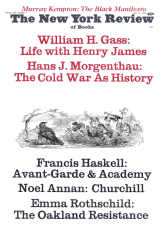In response to:
The Writing on the Wall from the January 30, 1969 issue
To the Editors:
Having been closely in touch with George Orwell for the last twenty years of his life, I have always hesitated to make any public guess about his probable attitude if he were alive today. How could I be sure I was not unconsciously invoking his name to give prestige to my own opinions? But now that Mary McCarthy, against whom no such suspicion can lie, has given a lead in your issue of January 30, perhaps I am free to comment on her very shrewd conjectures.
I am even more doubtful than she is that Orwell would have held orthodox leftist opinions about Vietnam. In 1984 he describes a world divided between three totalitarian empires: “Eastasia” (China and satellites), “Eurasia” (Russia and satellites), and “Oceania” (America and satellites). If he were alive today, he would see much that appears to support this forecast. To give one obvious example, De Gaulle’s dream of a Europe purged of Anglo-Saxons and extending “from the Atlantic to the Urals” might be the penultimate stage in the development of “Eurasia”—the incorporation of Europe into the Russian empire. (That the communists know this, if De Gaulle himself doesn’t, is proved by their pathetic embarrassment at any real threat to his position.) But Orwell’s prophecies were intended as warnings, not as predictions of fact, and he would still be hoping that the countries of Europe will not be absorbed into “Eurasia,” and that the other free countries of the world will not be absorbed into “Oceania” and “Eastasia.”
And as to America, whatever its faults, I do not think he would have seen American policy, anywhere in the world, as symptomatic of an emergent “Oceanian” Big Brother. No doubt he would often have been critical, but the current fashionable anti-Americanism, denigrating America and whitewashing its opponents, would have seemed to him, I think, either perverse or dishonest. Of course, America is not as good as it ought to be, but to say that it is therefore no better, or is even worse, than totalitarian China or Russia would probably have reminded him of a similar argument used by both pacifists and communists in the 1930s. He described it as the argument that “half a loaf is the same as no bread.”
Richard Rees
This Issue
July 10, 1969



